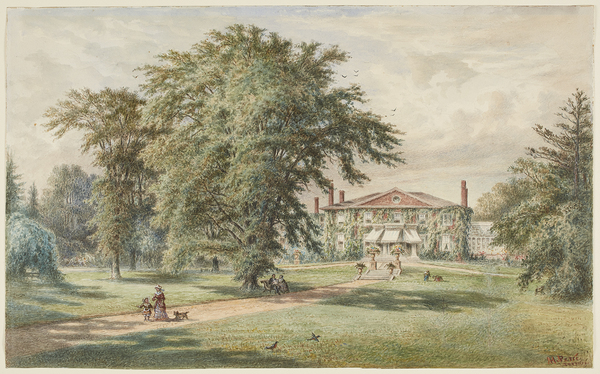
Source: Link
PERRÉ (Perri), HENRI, landscape painter and art teacher; b. probably in 1824 or 1825 in Strasbourg, France, of French and Prussian parents; d. unmarried 17 June 1890 in Toronto, Ont.
Henri Perré studied art in Dresden (German Democratic Republic) before being forced to flee to the United States after fighting in the 1849 uprisings in Saxony. References to his American career are primarily anecdotes of his friends who related that he had lived the life of a confirmed bachelor in the Carolinas, Cincinnati, Ohio, and Chicago before fighting in the Confederate army during the Civil War. He had made a brief visit to Toronto in 1854 and moved there in 1863. Perré, described by Canadian friends as eccentric but popular, lived in Toronto for much of the balance of his life, in the city’s downtown district and for a time in the quarters of the Ontario Society of Artists.
Principally a landscape artist, he not only painted in the Don valley and the Toronto environs but also made numerous sketching trips by railway: to Ancaster, Dundas, and Preston, Ont., in 1874 and 1881; to Bic and Matapédia, Que., in 1882; as well as to Muskoka and Owen Sound, Ont. However, during 1877–78 he visited Philadelphia, with fellow artist John Wesley Bridgman, and painted along the Schuylkill and Shenandoah rivers. Titles of his paintings indicate that in 1878 he visited Colorado and California at the time when Thomas Moran and other American artists were discovering the west, and several British Columbia views suggest that he went north from California to sketch there before that province had been linked to central Canada by rail. Perré’s rural landscapes, primarily in oil and water-colour, are usually modest in size, with the exception of the large Niagara Falls. His realistic style is allied to that of the late Hudson River school of painters and other contemporary American landscapists. Despite his large output (approximately 150 works were exhibited at Ontario Society of Artists and Royal Canadian Academy exhibitions between 1874 and 1889), few are now in public collections. His academy diploma work, Landscape (in the National Gallery of Canada, Ottawa), and a water-colour, Cliff and cove (in the Art Gallery of Ontario, Toronto), are landscapes characterized by minute figures as central themes surrounded by trees, rocks, and water.
While teaching the antique, drawing from casts of classical sculpture, at the Ontario School of Art (now the Ontario College of Art), Toronto, from 1876 to 1882, Perré instructed the school’s early students, including George Agnew Reid*. He probably also influenced the youthful Homer Ransford Watson*, whom he met at the Toronto photographic studio of William Notman*. They may have been sketching companions given the fact that Perré’s Dundas Road and Watson’s The old Dundas Road (National Gallery of Canada) both date from 1881. Perré was elected a member of the Ontario Society of Artists in 1874 and was a close associate of society members who proposed him as a charter member of the Royal Canadian Academy of Arts in 1880. He exhibited with both societies, as well as at the Art Association of Montreal and at the Toronto Industrial Exhibition. His paintings were displayed in the Canadian sections at the Philadelphia Centennial International Exhibition, 1876, and the Colonial and Indian Exhibition, London, 1886.
Can., Dept. of Agriculture, Colonial and Indian Exhibition of 1886: a revelation of Canada’s progress and resources; extracts from British and colonial journals (Ottawa, 1887). Canadian Illustrated News (Montreal), 10 June 1871, 29 June 1872. Globe, 19 June 1890. L’Opinion publique, 27 juin, 18 juill. 1872. Art Assoc. of Montreal, Catalogue of the annual spring exhibition of works by Canadian artists (Montreal), 1880–83. Harper, Early painters and engravers. National Gallery of Canada, Catalogue of paintings and sculpture, ed. R. H. Hubbard (3v., Ottawa and Toronto, 1957–60), III. Royal Canadian Academy of Arts, Annual exhibition, 1880–86. Toronto Industrial Exhibition, Catalogue of the Art Department (Toronto), 1881–90. W. [G.] Colgate, Canadian art: its origin & development (Toronto, 1943; repr. 1967). Harper, Painting in Canada. Newton MacTavish, The fine arts in Canada (Toronto, 1925). Edmund Morris, Art in Canada: the early painters ([Toronto, 1911?]). A. H. Robson, Canadian landscape painters (Toronto, 1932). J. W. L. Forster, “The early artists of Ontario,” Canadian Magazine, 5 (May–October 1895): 17–22. “A guide to Canadian painters,” comp. M. E. Hughes, Ontario Library Rev. (Toronto), 24 (1940): 187–209, 281–96.
J. Russell Harper, “PERRÉ (Perri), HENRI,” in Dictionary of Canadian Biography, vol. 11, University of Toronto/Université Laval, 2003–, accessed November 28, 2024, http://www.biographi.ca/en/bio/perre_henri_11E.html.
The citation above shows the format for footnotes and endnotes according to the Chicago manual of style (16th edition). Information to be used in other citation formats:
| Permalink: | http://www.biographi.ca/en/bio/perre_henri_11E.html |
| Author of Article: | J. Russell Harper |
| Title of Article: | PERRÉ (Perri), HENRI |
| Publication Name: | Dictionary of Canadian Biography, vol. 11 |
| Publisher: | University of Toronto/Université Laval |
| Year of publication: | 1982 |
| Year of revision: | 1982 |
| Access Date: | November 28, 2024 |